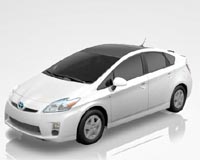 |
Beijing (AFP) Dec 14, 2009 China's Beijing Automotive Industry Holding Co. (BAIC) said Monday it has agreed to buy the intellectual property rights for some assets of General Motors' Swedish unit Saab. The deal comes after BAIC, China's fifth largest automaker, and Swedish high-performance carmaker Koenigsegg gave up their joint bid for Saab last month, citing costly delays in the transaction. State-owned BAIC will acquire the technology for Saab's 9-3 and 9-5 car models, turbine engines and gearboxes, it said in a statement. Saab will also help BAIC develop its own-brand cars using the Swedish carmaker's technology, it said. Financial details of the deal were not released. The Chinese company said the deal was an "important milestone for BAIC and Saab's strategic cooperation and paved a good foundation for the two sides to further explore and expand win-win cooperation". Jan Ake Jonsson, managing director of Saab, said in a separate statement that the deal was "excellent for both parties, now and for the future." "We have developed a good relationship with BAIC and look forward to working with them to integrate this Saab technology into their future vehicles," Jonsson said. Hou Yankun, a Hong Kong-based analyst at Nomura International, told AFP: "I think it's a clever move -- Chinese companies have had a hard time operating the brands they acquired. "What the Chinese auto sector is in need of is technology. When you have the technology you can launch improved models, which is the key, and build your own brand step by step." The BAIC-Koenigsegg bid for Saab fell through as Koenigsegg needed a 600-million-dollar loan from the European Investment Bank and wanted the Swedish government to act as a guarantor, but the request was not acted upon. Despite the setback, analysts had not ruled out BAIC pursuing the bid on its own given its financial strength and desire to access foreign technology. In the first six months of this year, BAIC reported a net profit of 370 million dollars, up 78 percent from the same period last year, previous state media reports said. BAIC, founded in 1958, already has joint ventures with Daimler and South Korea's Hyundai. An attempt to buy Opel, another European unit of the troubled US auto giant GM, collapsed in July after BAIC failed to reach an agreement with the US company due to intellectual property rights concerns. Despite the deal with BAIC, the future of the Saab nameplate remains uncertain. Dutch sports car maker Spyker said early this month that it was in talks with GM on the possibility of buying Saab from the US company. GM said previously it has received interest from buyers and would decide the fate of its Swedish unit, which employs 3,400 people, by the end of December. It has warned it may end the Saab brand if it fails to find a suitable buyer. Share This Article With Planet Earth
Related Links Car Technology at SpaceMart.com
 Toyota aims to roll out plug-in Prius in two years
Toyota aims to roll out plug-in Prius in two yearsTokyo (AFP) Dec 14, 2009 Toyota Motor said Monday that it plans to begin commercial sales of its first plug-in hybrid vehicle in about two years, aiming to meet growing demand for fuel-efficient cars. The Japanese giant, the world's largest automaker, hopes to sell several tens of thousands of the plug-in Prius car, which it says will have an affordable price tag. In part to gauge demand for the cars, Toyota ... read more |
|
| The content herein, unless otherwise known to be public domain, are Copyright 1995-2009 - SpaceDaily. AFP and UPI Wire Stories are copyright Agence France-Presse and United Press International. ESA Portal Reports are copyright European Space Agency. All NASA sourced material is public domain. Additional copyrights may apply in whole or part to other bona fide parties. Advertising does not imply endorsement,agreement or approval of any opinions, statements or information provided by SpaceDaily on any Web page published or hosted by SpaceDaily. Privacy Statement |